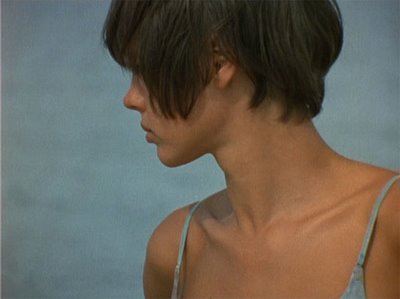DVD: Six Moral Tales
| Available at Amazon: Eric Rohmer, Six contes moraux (Six moral tales) (new DVD set released on August 15, 2006) |
1. La Boulangère de Monceau (The baker's girl of Monceau, 1963)
2. La Carrière de Suzanne (Suzanne's career, 1963). The first two films, a pair made together in 1963, are shorts, while the last four are feature-length. In both, Rohmer sets the mold for his series, showing us characters who must decide between the love of two people. Rohmer is often described as a French director similar to Woody Allen, and it is true that although these films are ostensibly about moral lessons, the form of morality is not always what you might expect.
3. Ma nuit chez Maud (My Night at Maud's, 1969). Jean-Louis Trintignant has a face like a wall, impassive yet with things written all over it. He was a delight as the malicious judge in Kieslowski's Rouge, the bitter foil to Irène Jacob's blessed innocence. In Rohmer's film, he plays a devout Catholic with a moral conflict. He is attracted both to Maud (Françoise Fabian), recently divorced, with whom he spends the eponymous night, and a beautiful woman he sees at Mass, Françoise (Marie-Christine Barrault). This is one of Rohmer's most dialogue-centered movies, with long shots of one actor, the other in dialogue off camera. It is heavy on intellectual conversation, including a fascinating argument about the relationship of mathematics to Pascal's wager. There are beautiful, foggy shots of Clermont-Ferrand, especially the church where the two meet, which is I believe Notre Dame du Port. The footage of Mass is of historical interest, showing the service in French not long after Vatican II.
 Haydée Politoff as Haydée, La Collectioneuse (1967), directed by Eric Rohmer |
5. Le Genou de Claire (Claire's Knee, 1971). This movie is set among the wealthy residents of the Lac d'Annecy and its particular vice is the same as in Lolita. Aurora Cornu plays a Romanian novelist -- wonderful accent in French -- who dares her friend Jérôme (Jean-Claude Brialy) to indulge in a flirtation with her host's teenage daughter. The shots of the lake and the mountains are beautifully done, and the two jeunes filles en fleurs -- Béatrice Romand (Laura) and especially Laurence de Monaghan (Claire) -- are no less lovely. The crucial moment, a simple caressing of a girl's knee during a storm off the Lac d'Annecy, is both innocent and depraved. The two older characters talking about the conquest of a teenager, making it into a narrative, reminds me of the Vicomte de Valmont and the Marquise de Merteuil in Les Liaisons Dangereuses.
6. L'Amour l'après-midi (Chloe in the Afternoon, 1972). This is probably the best known Rohmer movie in the United States, and I think it is the strongest of the six. Bernard Verley plays Frédéric, a businessman with a wife and young child. A chance meeting with an old friend, Chloé (Danièle Ciarlet, who went by the screen name Zouzou), creates turbulence in his carefully ordered life. Incredibly, this fling is never about sexual gratification, at least not on the surface. As in so many of Rohmer's "moral tales," the lesson is about the choice of self-restraint. A strange thing in France.





















































No comments:
Post a Comment